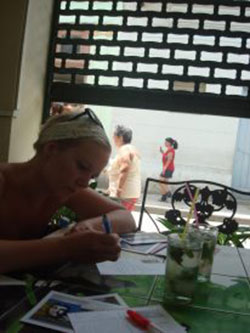Hanna Lempinen is a researcher in the NPE group at the Arctic Centre and a PhD candidate at the University of Lapland. Her doctoral dissertation focuses on security, sustainability and agency through a case study focus on the Barents energyscape
 I first thought about becoming a researcher for the first time probably during the second year of my studies at the University of Lapland. I was an International Relations major who had just found environmental sociology and unable to come up with a ‘normal’ job I could have imagined having. A couple of years after this, I found myself conducting an internship as a research assistant at the Arctic Centre. A couple of more years (and a brief employment history in HR, communications, journalism and teaching) later, I found myself back at the Arctic Centre again.
I first thought about becoming a researcher for the first time probably during the second year of my studies at the University of Lapland. I was an International Relations major who had just found environmental sociology and unable to come up with a ‘normal’ job I could have imagined having. A couple of years after this, I found myself conducting an internship as a research assistant at the Arctic Centre. A couple of more years (and a brief employment history in HR, communications, journalism and teaching) later, I found myself back at the Arctic Centre again.
Throughout my academic career I have had a profound interest on the ways in which societies, environment and language come together. However, I have slowly ventured from topics related directly to the environment more and more towards looking at energy-related debates and developments. As a theme intersecting with so many domains of societal and daily life all over the globe, energy and related questions – like availability, environmental and social impacts, price, and so on – are at the same time concerns that are shared by all communities but also concerns that take very different forms in different geographical, cultural and social settings.
My current work has a twofold focus. On the one hand, I am interested in the theoretical stuff and the ways in which different concepts – like security or sustainability – are used not only in academic literature, but in also political debates. I am fascinated with how same notions can be used to serve and justify very different goals and to back up very different kinds of arguments. The way how exactly same words and concepts can mean very different things in different contexts is equally interesting.
On the other hand, I also want to do research that connects to the world outside the academia and contributes to what is happening in the ‘real world’. This is why I am looking at the theoretical and conceptual themes through a concrete case study. The environmentally, culturally, politically and economically diverse Barents region has been placed in the center of international political attention and large-scale energy development plans. Through my own work I hope to be able to take part in building a more socially and environmentally sustainable basis for regional energy policies and development.
P.S. When I’m not working on the research, I travel, run, scuba dive, listen to music, meet people, eat well and drink lots of strong coffee.
Photo credits: Anni Lahtinen in Havanna, Cuba.